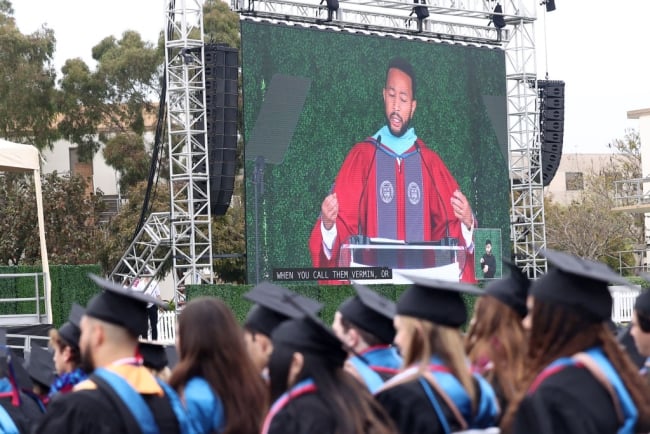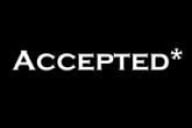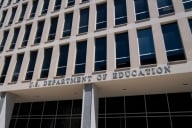You have /5 articles left.
Sign up for a free account or log in.

Graduating Loyola Marymount University students watched John Legend speak about ongoing crises around the world.
Tommaso Boddi / Getty Images
It’s been a tumultuous graduation season, marked by cancelled speeches, relocated ceremonies, walkouts and protests, and, of course, a few controversies. At Ohio State University, entrepreneur Chris Pan delivered a speech that he later said he had written while on ayahuasca, while Harrison Butker, a professional football player, delivered a highly controversial speech to Benedictine College graduates, condemning COVID-19 lockdowns, the LGBTQ+ community, abortion and more.
But other speakers used the platform to address pressing issues in higher education, the world that today’s graduates are entering and other topics important to Generation Z.
On Democracy and Civic Duty
“There is no real choice this November. There is only the perpetuation, however flawed and feeble you might perceive it, of our fragile 249-year-old experiment or the entropy that will engulf and destroy us if we take the other route. When, as Mercy Otis Warren [an 18th century writer and activist] would say, ‘The checks of conscience are thrown aside and a deformed picture of the soul is revealed.’ The presumptive Republican nominee is the opioid of all opioids, an easy cure for what some believe is the solution to our myriad pains and problems, when, in fact, with him, you end up re-enslaved with an even bigger problem, a worse affliction and addiction, ‘a bigger delusion,’ James Baldwin would say, the author and finisher of our national existence, our national suicide as Mr. Lincoln prophesies. Do not be seduced by easy equalization. There is nothing equal about this equation. We are at an existential crossroads in our political and civic lives. This is a choice that could not be clearer.
“Choose honor over hypocrisy, virtue over vulgarity, discipline over dissipation, character over cleverness, sacrifice over self-indulgence. Do not lose your enthusiasm; in its Greek etymology the word enthusiasm means simply, ‘god in us.’ Serve your country. Insist that we fight the right wars. Denounce oppression everywhere. Convince your government, as Lincoln understood, that the real threat always and still comes from within this favored land. Insist that we support science and the arts, especially the arts. They have nothing to do with the actual defense of our country; they just make our country worth defending. Remember what Louis Brandeis said, ‘The most important political office is that of the private citizen.’ Vote. Please, vote. You indelibly underscore your citizenship, and most important, our kinship with each other when you do. Good luck and godspeed.”
— Ken Burns, documentarian, May 19 at Brandeis University
“In 2023, the global democracy index fell to its lowest level ever. Today, 71 percent of the world lives under autocratic rule. We are electing illiberal leaders democratically. And once in power, these autocrats not only crush institutions in their countries, but form alliances and create Kleptocracy, Inc. This is your challenge. It is our challenge.
“And Harvard played a role in getting us here. Seven years ago, Mark Zuckerberg stood at this podium, finally got his degree, and said that his life’s purpose was to connect the whole world. Move fast, break things, Facebook said. Well, it broke democracy. In my book How to Stand Up to a Dictator, we were fighting two, not just Rodrigo Duterte in the Philippines—he’s one man who crushed institutions—but even more powerful was Mark Zuckerberg, because he, along with tech bros, are controlling the world.
“I will shut up. Enough, right?
“Because let me bring it to you. The battle to regain trust begins now. With all of you. Harvard says it educates the ‘future leaders’ of the world. Well, if you future leaders don’t fight for democracy right now, there will be little left for you to lead.”
— Maria Ressa, investigative journalist, May 23 at Harvard University
On Lessons From History
“When we look back in time, we can see that the founding generation got some things right … They got some things right, but they didn’t get everything right. They said things like, ‘All men are created equal,’ and then, you know from the Hamilton play that one of the Schuyler sisters said, ‘Now, when I see this Jefferson, I’m going to get him to include women, too.’ They got some things right, but they had no idea that a woman could be the president of the College of William & Mary in Virginia. They got many things right, but they had no idea that a person of color could be the president of the United States of America. They got a whole lot of things right, but they never thought that a member of the native tribes of America could be in the cabinet of a president of the United States and run a powerful office of government. They didn’t get it all right.
“And so what I want to say to you is that when you deal with history, what I want you to do is not be overawed by it. Don’t be hamstrung by it. Don’t be worshipful of history. Look at it. Learn from it. Take the best that they had and build the better world that we are called upon to do. And that’s what I'm going to depend on you to do.”
— John Charles Thomas, former Justice of the Supreme Court of Virginia, May 20 at William & Mary
On Speaking and Listening
“Universities have a responsibility to ensure they maintain an environment in which all students can thrive and learn, but it’s not their job to protect students from hearing or engaging with upsetting or even hurtful ideas. In fact, it’s the universities’ job to prepare the leaders of tomorrow by exposing them to challenging worldviews, competing analyses. The leaders of tomorrow—you, the Class of 2024—need to be comfortable with the contestation of facts and the clash of ideologies.
“Sometimes this is a hard line to walk. As passionately as students care, free speech is not a license for violence, property destruction, or physical intimidation or harassment of other students. And as worried as administrators are, they must respect their students’ free speech rights and honor the long and important tradition of student campus activism.
“Class of 2024, you are graduating at a challenging moment. No one would blame you if you wanted to reconsider your career in leadership and public service right now. But I’m guessing that’s not going to happen. You are New York City tough. You are City College trained. You follow in the footsteps of [Felix] Frankfurter, [Faith] Ringgold, [Herb] Sandler and [Colin] Powell. You are meant for more. Much has been given to you and even greater things are expected from you.”
— Anthony D. Romero, executive director of the American Civil Liberties Union, May 30 at The City College of New York’s Colin Powell School for Civic and Global Leadership
“How do we engage with complexity? We do it by listening with more humility. Listening with more curiosity. Listening with more intentionality. Listening with more empathy. After all, with the freedom of speech comes the responsibility to give a full and fair hearing.
“We engage with complexity by recognizing that in a multiracial, multiethnic, pluralist democracy, we are going to disagree. That’s inevitable. The noise and the mess are features, not bugs. At the same time, though, diversity and difference need not be synonymous with intractable division. Even when we disagree, we have no choice but to find ways to tolerate each other, to respect each other, to live with each other.
“We might start with the assumption that, for the most part, most of the time, most people are operating in good faith. So we can extend grace to them—and the benefit of the doubt. We might acknowledge that we each are bringing our own histories and experiences and biases to our perceptions—our own legitimate fears and anxieties.
“And then we might—each of us—try to see the world through one another’s eyes: To do the really hard thing—to genuinely honor one another’s humanity, even when we disagree—because we all are someone’s child, or sibling, or friend.”
— John Legend, musician, May 4 at Loyola Marymount University
On the Value of Community College
“I teach at a community college for the same reason students go to community colleges. They’re flexible and meet people where they are. And, as my husband, President Biden, says, they provide the ‘best career training in America.’
“Community colleges should be free. This community knows that. From shipyards to steel mills to health care centers, there are jobs here that need workers with the training to fill them. And when people told you that this city is too small or it will be too hard to start a new school, you fought for one anyway, because Erie doesn’t do ‘can’t.’ And four years ago, with the pandemic raging, before classes had started or students had enrolled, I joined leaders here—some of whom are with us today—to talk about the promise ahead. I told you that community colleges change lives. And graduates, you have made that promise real one paper, one project, one credit—one job offer—at a time.”
— Jill Biden, first lady of the United States of America, June 1 at Erie Community College
On Embracing Your Quirkiness
“When I was growing up, shame and fear was all around me. We had to dress a certain way, we had to laugh a certain way. It was always, ‘Just be normal, Jennifer, just be normal.’ And I heard that so many times, and not being normal, that felt painful. But, Class of 2024, don’t run from yourself like I did. You’ll lose decades; I promise you, I did. Instead, choose radical self-acceptance and compassion. It sounds so simple, and it is, but it’s so hard to act on. It takes bravery that you don’t believe you have, but you do.
“I stand before you as a weird person. Get to know yourself, accept who you are, and love that person because, this is the moment. You already are everything you need to be.”
— Jennifer Coolidge, actress, May 13 at Washington University in St. Louis
“Recently, I was reading about an event I’d be attending and I saw that there would be an early childhood education expert there. I was really looking forward to meeting them and gaining insights from their wealth of knowledge. As I read more about the event, I suddenly realized the early childhood expert that was attending the event was me. That led to panic and the feeling that I had tricked people into thinking I knew stuff. I definitely have impostor syndrome. I have it right now. I’m kind of freaking out.
“A lot of us have thoughts, like that: You're not good enough. You should shrink and not take up space. Remember how you didn’t make it into the gifted and talented program in second grade? I’m still bitter about that.
“When I attended Steinhardt, I felt hopeful about making a difference as a public school music teacher. But I also felt like I was way behind my peers. I was the oldest in the program … Back [in] high school, I wasn’t a great student. I only got into one college, which made the choice of where to go very easy.
“I failed a lot, but I kept showing up until I found my calling. You don’t have to be the smartest, the coolest—I’m really dorky—have the most connections. It’s the people who keep showing up and taking action that make a difference. Keep showing up and believe that it’s possible to build something beautiful where there has been destruction. Believe that you can help where it seems hopeless.”
— Rachel Griffin-Accurso, online children’s entertainer known as ‘Ms. Rachel,’ May 16 at New York University’s Steinhardt School of Culture, Education, and Human Development
On Missing Commencement
“I thought I was too cool to go through [my] commencement ceremony, and I thought I couldn’t afford, like, $80 for the gown or whatever. So I went to my friend Brian Zinda’s house to watch a basketball game. So for the past three decades, whenever I talk about this—because it’ll come up, especially if you’re going to give a speech at a college—people will ask you, ‘What do you remember about yours?’
“I always explain that the reason I have this vivid memory is because in this basketball game, which I think was March 15, 1994, this player named Kevin Johnson—who would later become the mayor of Sacramento—he had this amazing dunk over Hakeem Olajuwon on the left baseline where he came in and dunked over him.
“You can find it on YouTube; it’s sort of like the defining moment in this guy’s career. So whenever I can tell this anecdote, I always mention, ‘Oh, I didn’t go to my graduation, but I saw this amazing dunk by Kevin Johnson.’
“This anecdote, though, is kind of a lie. I am kind of lying when I say it.
“I did watch that basketball game, and I do remember it, but it’s not because of anything that actually happened in the game. It’s because I knew that I was purposefully skipping an event that was significant. I think unconsciously, I had convinced myself not to care about this experience, because I didn’t want to believe that it mattered.
“I didn’t like the idea of some moment in my life having any kind of—I don’t know, transformative meaning to it. I think I kind of just blocked it out.
“And now I would guess, there are probably some of you who are in this same position right now—like, you’re listening to this speech, and you’re like, ‘It’s boring,’ ‘I want this to be done,’ ‘This seems like a formal construct,’ ‘I’m doing this out of obligation for my parents.’
“A whole bunch of stuff. You might sort of feel like this is something you just got to get done.
“But here’s the truth. You’re going to remember this day whether you want to or not, because that’s how the human mind works.”
— Chuck Klosterman, journalist and author, May 14 at the University of North Dakota








